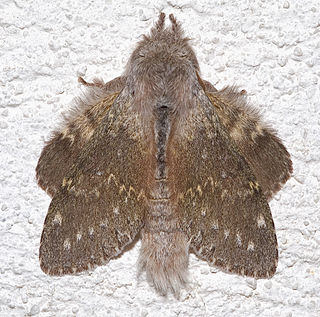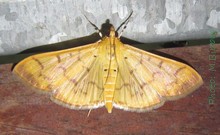
Lepidoptera is an order of insects that includes butterflies and moths. About 180,000 species of the Lepidoptera are described, in 126 families and 46 superfamilies, 10 per cent of the total described species of living organisms. It is one of the most widespread and widely recognizable insect orders in the world. The Lepidoptera show many variations of the basic body structure that have evolved to gain advantages in lifestyle and distribution. Recent estimates suggest the order may have more species than earlier thought, and is among the four most speciose orders, along with the Hymenoptera, Diptera, and Coleoptera.

Ypsolophidae is a family of moths with some 160 species. They are included in the Plutellidae by many authors.

The heart and dart is a moth of the family Noctuidae. A familiar moth to many, it is considered one of the most common of the European region. It occurs throughout the Palearctic ecozone from Ireland to Japan.

Norman Barnett Tindale AO was an Australian anthropologist, archaeologist, entomologist and ethnologist.

The Insect-class gunboats were a class of small, but well-armed Royal Navy ships designed for use in shallow rivers or inshore. They were intended for use on the Danube against Austria-Hungary. The first four ships—Gnat, Mantis, Moth and Tarantula—were first employed during the World War I Mesopotamian Campaign on the Euphrates and Tigris rivers.

The de Havilland DH.60 Moth is a 1920s British two-seat touring and training aircraft that was developed into a series of aircraft by the de Havilland Aircraft Company.

The Japanese house bat or Japanese pipistrelle is a species of vesper bat. An adult has a body length of 3.6–4.8 cm (1.4–1.9 in), a tail of 2.9–4.0 cm (1.1–1.6 in), and a wing length of 3.2–3.6 cm (1.3–1.4 in). It prefers to roost under the ceiling or inside the roof of old buildings. It is found across East Asia, from China and Taiwan into the Ussuri region, the Korean Peninsula, and Japan.

The lobster moth, also known as lobster prominent, is a moth from the family Notodontidae. The species was first described by Carl Linnaeus in his 1758 10th edition of Systema Naturae. The English name refers to the crustacean-like appearance of the caterpillar.

Abraxas sylvata, the clouded magpie, is a moth of the family Geometridae that was named by Giovanni Antonio Scopoli in 1763.

Eupoecilia ambiguella, the vine moth, is a moth of the family Tortricidae. It is found in Europe, China, India, Japan, Korea, Mongolia and the Russian Far East.

Cnaemidophorus rhododactyla, the rose plume moth, is a moth of the superfamily Pterophoroidea, family Pterophoridae. It is found in the Northern Hemisphere, except for Greenland, Southeast Asia, and most of North Africa.

HMS Moth was an Insect-class gunboat of the Royal Navy. Entering service in 1916, Moth had a varied career with service in the Middle East, the White Sea and the Far East in two world wars. Scuttled in World War II during the invasion of Hong Kong, the ship was raised and put into service by the Imperial Japanese Navy as Suma (須磨). The ship remained active throughout the war, before striking a naval mine in the Yangtze River in 1945 and sinking.

Adaina microdactyla is a moth of the family Pterophoridae. It has a wide distribution and is known from the Palearctic ecozone, Asia Minor, Iran, Vietnam, the Solomon Islands, the Philippines, Sri Lanka, Indonesia and Papua New Guinea. It is also found in Africa, including the Democratic Republic of the Congo and Madagascar.

Autosticha is a genus of gelechioid moths. It belongs to the subfamily Autostichinae, which is either placed in the concealer moth family (Oecophoridae), or in an expanded Autostichidae. It is the type genus of its subfamily. Originally, this genus was named Automola, but this name properly refers to a fly genus in family Richardiidae.

Patania balteata is a moth of the family Crambidae. It was described by Johan Christian Fabricius in 1798. It is found across southern Europe, Africa and Asia, including Japan, Korea, Réunion, Madagascar, Taiwan, Thailand, Turkey and Ukraine, as well as New South Wales and Queensland in Australia. There is also an old record from Hawaii.

Konchuuki is a studio album by the Japanese noise musician Merzbow. It was released on August 11, 2015 by the Brazilian label Essence Music in standard and deluxe editions, and is his third release for the label.


















